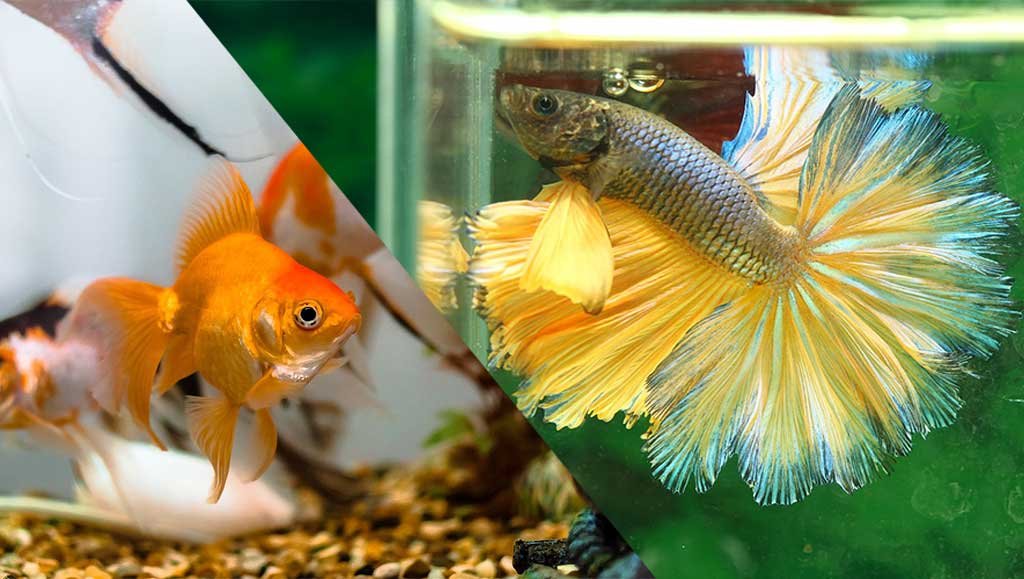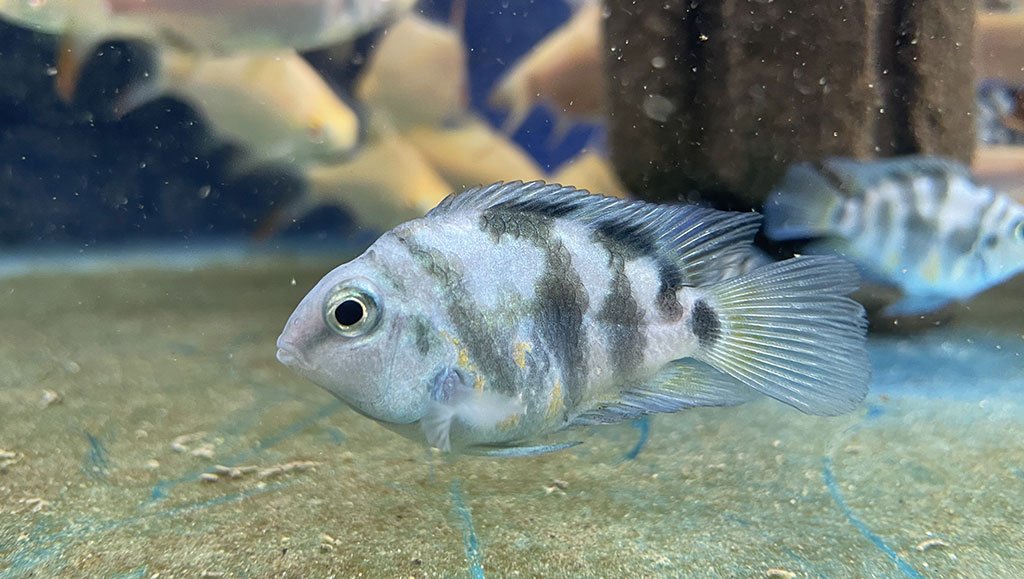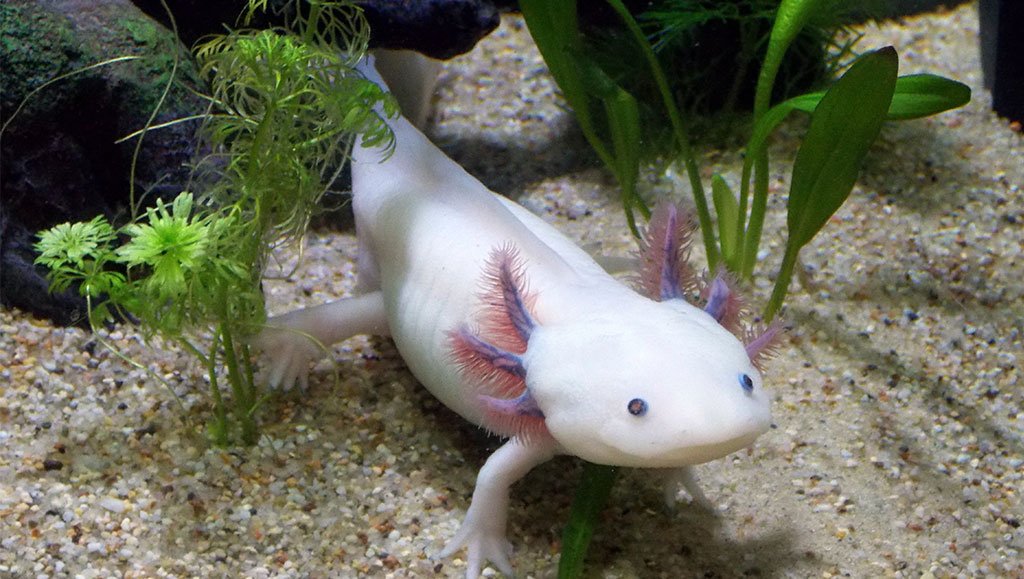Oh, the colorful world of fishkeeping! If you’ve ever gazed into the shimmering waters of an aquarium, you might have marveled at the mesmerizing dance of Betta fish and the serene glide of Goldfish. But here’s a question that might have crossed your mind – Can a Betta fish eat Goldfish food? This puzzle had me scratching my head too! After venturing deep into the world of aquatic nutrition and consulting with a few experts, I’ve uncovered some fascinating insights that I’m absolutely thrilled to share with you!
Key Takeaways: Can Betta Fish Eat Goldfish Food?
Hey fellow Betta enthusiasts! Reflecting on our discussion about whether Betta fish can eat goldfish food, I want to share some key insights from my own experiences that will help guide you in making the best dietary choices for your vibrant little friends:
- Goldfish food is a no-go for long-term Betta diet: Based on my personal experience, while Bettas can technically nibble on goldfish food, it really shouldn’t become a staple of their diet. The nutritional content isn’t tailored to meet the specific needs of our carnivorous Bettas.
- Prioritize Bettas’ natural dietary needs: Always remember that Bettas thrive on a diet high in protein, mimicking their carnivorous nature in the wild. Opt for foods specially formulated for Bettas to keep them healthy and their colors bright.
- Variety is key: Just like us, Bettas love variety in their diet. Mixing it up with pellets, frozen, and live foods not only keeps them interested but ensures they get a wide range of nutrients.
- Seek advice and keep learning: The wisdom of experts, both in-person and online, has been instrumental in shaping my approach to Betta care. Don’t hesitate to reach out to fish health veterinarians, join Betta care communities, and absorb all the information you can.
- Look out for the right signs: Always observe how your Betta responds to their diet. If they’re healthy, active, and their colors are vibrant, you’re on the right track. Any deviation might mean it’s time to reconsider their diet.
Understanding Goldfish Food
Before we can leap into whether Betta fish can share a menu with Goldfish, it’s crucial to understand what’s on the Goldfish menu to begin with. My adventures in fishkeeping have taken me on a deep dive into what exactly makes up Goldfish food and why it’s formulated the way it is. And folks, the insights I’ve gathered are as interesting as they come!
Composition and Nutritional Content of Goldfish Food
Goldfish food is a carnival of nutrients, designed to float or sink in the water, meeting the natural feeding habits of your aquatic pals. Through my explorations, I discovered that it’s rich in carbohydrates and fiber, catering to Goldfish’s need for high-energy foods that support their constant grazing and digestion. The presence of proteins and essential vitamins ensures growth, health, and color vibrancy. It’s like a gourmet feast that keeps them swimming happily!
Varieties of Goldfish Food Available in the Market
Wandering through the aisles of pet stores and browsing online shops opened my eyes to the splendid array of Goldfish food options. From flakes that flutter down like confetti to pellets that offer a crunch, and even frozen or live treats that bring the thrill of the hunt into the tank! Each variety promises a balance of nutrients, aimed at keeping your Goldfish thriving. It was mesmerizing to witness the options at my disposal.
Differences Between Goldfish and Betta Fish Nutritional Requirements
Now, this is where it gets riveting! My chats with experts and personal fishkeeping escapades revealed that Betta fish and Goldfish are like diners with completely different palates. Bettas are carnivorous warriors, craving a diet rich in protein to mirror their insect-eating tendencies in the wild. On the other hand, our Goldfish friends are more like the vegetarians of the aquatic world. The difference in dietary needs is stark, making the suitability of Goldfish food for Bettas a complex topic.
The Importance of Specific Diets for Aquarium Health
One of my most profound realizations in this exploration was the critical role that specialized diets play in maintaining the ecosystem of an aquarium. Each fish species thrives on a diet crafted for its specific nutritional needs, directly influencing their health, color, and longevity. Tailoring your fish’s diet isn’t just about meeting their nutritional demands; it’s about creating a vibrant, balanced aquarium where every inhabitant lives its best life.
Personal Anecdotes on Feeding Mistakes and Lessons Learned
Throughout my fishkeeping journey, there were mishaps, of course. Like the time I accidentally fed my Betta fish Goldfish flakes and watched in confusion as he ignored them. It was a stark lesson in the importance of species-specific diets but also a stepping stone to understanding and appreciating the diversity of life under the water’s surface even more.
Assessing the Suitability of Goldfish Food for Betta Fish
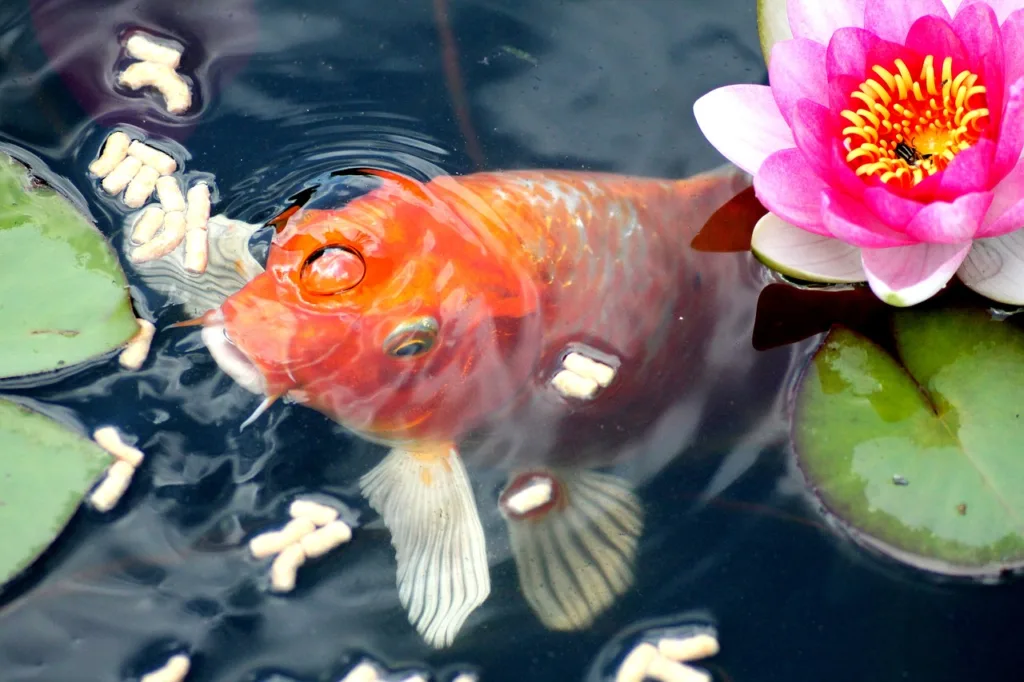
Ah, the moment we’ve all been waiting for! Can Betta fish really share a dining table with Goldfish? Armed with enthusiasm and tons of curiosity, I dove into the heart of this question. My fishkeeping escapades and nuggets of wisdom from experts have served as my compass on this adventure. Here’s what I found out:
Comparison of Nutritional Needs Between Betta Fish and Goldfish
You see, comparing the nutritional needs of Betta fish with Goldfish is like comparing apples and oranges. Bettas thrive on a diet rich in proteins, as they’re natural carnivores, reveling in the hunt and devouring protein-packed meals that mimic their diet in the wild. Meanwhile, Goldfish are the gentle vegetarians of the aquatic realm, basking in a diet heavy on carbohydrates and fiber to keep their energy up and their health in check. This fundamental difference was my first clue that perhaps, what’s on the Goldfish’s plate might not perfectly cater to the needs of a Betta.
Potential Benefits and Drawbacks of Feeding Goldfish Food to Betta Fish
Now, here’s a twist – in a pinch, Betta fish can actually nibble on Goldfish food without facing the apocalypse. However, making it a staple could lead to nutritional deficiencies, particularly in protein. The primary drawback? Betta fish might miss out on the essential nutrients their carnivorous hearts desire. On the flip side, the occasional gulp of Goldfish food isn’t a highway to disaster, but it’s certainly not the expressway to vibrant health and colors either.
Considerations for Betta Fish Health and Digestive Capacity
This exploration wouldn’t be complete without considering how Goldfish food aligns with a Betta’s health and digestive system. Bettas have a more streamlined digestive tract suited for meaty feasts, making high-carb Goldfish food a bit of a square peg in a round hole. Overfeeding them with Goldfish food could lead to bloating and digestive issues, a scenario I’m sure we’d all like to avoid.
Experimenting with a Balanced Diet
In my own tanks, I’ve experimented with striking a balance. I introduce a medley of specialized Betta food with occasional (and I cannot stress ‘occasional’ enough) Goldfish treats, observing my Betta’s health, energy, and coloration. It’s a delicate dance, but one that’s brought me closer to understanding the intricate needs of these aquatic marvels.
Final Recommendations for Fish Enthusiasts
Based on my adventures and misadventures in fishkeeping, my heartiest recommendation is to stick with species-specific diets as much as possible. It ensures your aquatic buddies thrive, showcasing their brightest colors and sprightliest energy. But hey, don’t fear experimenting in moderation, under a watchful eye, of course. After all, the world of fishkeeping is as vast as it is vibrant, and there’s always something new to learn from the wet world beyond the glass!
Feeding Betta Fish Goldfish Food: Pros and Cons
Oh, the topics we wade into when we venture into the world of aquatics! One of the more curious inquiries I’ve navigated is the feasibility and wisdom of feeding Betta fish with Goldfish food. It’s been an experiment, a learning curve, and heck, even a topic of heated debate among my fellow enthusiasts! Here’s the scoop from my own tank to yours:
Potential Benefits of Goldfish Food for Betta Fish Health and Coloration
Believe it or not, there have been moments when Goldfish food seemed to add a sprinkle of magic to my Betta’s day. On the rare occasion, this unconventional choice offered a change in routine, possibly stimulating interest and activity. Some argue that the variety might even enhance coloration momentarily, though my mileage varied. It’s akin to a rare treat, not the main course but a whimsical snack that might just spark a little extra vigor in their swim.
Risks Associated with Goldfish Food: Digestive Issues, Nutritional Deficiencies, and Overfeeding
However, it’s not all sunshine and raindrops. Goldfish food in a Betta’s diet is like a double-edged sword. The major concern lies in the mismatch of nutritional profiles. Goldfish, being the laid-back vegetarians they are, dine on a buffet that is less protein-dense. Bettas, with their carnivorous leanings, require a feast rich in protein. Overindulging in Goldfish fare could lead to digestive woes, an unhealthy build-up of fats, and even nutritional deficiencies over time. These risks made me tread carefully, balancing curiosity with caution.
Guidelines for Supplementing Betta Fish Diet with Goldfish Food
If you’re venturing into the experimental, like I did, here’s a nugget of advice: moderation is key. Consider Goldfish food as an occasional garnish rather than a staple. Watch your Betta’s reaction closely—their energy, color, and behavior will guide you. And always ensure the bulk of their diet is high-quality Betta food, rich in the proteins and nutrients their feisty, carnivorous selves thrive on.
The Importance of Observing Your Betta’s Behavior and Adjusting Accordingly
In my fishkeeping escapades, observation has been my greatest tool. Each Betta is a character, with preferences and quirks all their own. If they turn their noses up at Goldfish food or seem less vibrant, it’s a sign to revert back to their natural, protein-rich diet. Your Betta’s well-being is the ultimate guide to what works and what doesn’t in their complex, fascinating world.
Experimenting Responsibly with Diet Variation
Finally, a note on responsible experimentation. Variety in diet, when aligned with nutritional needs, can indeed be the spice of life for your aquatic pals. Introducing occasional, safe variations can contribute to an enriched environment, potentially boosting health and morale. But, it’s a path paved with careful consideration and informed choices. Always prioritize the well-being of your finned friends in every dietary decision.
Alternatives to Goldfish Food for Betta Fish
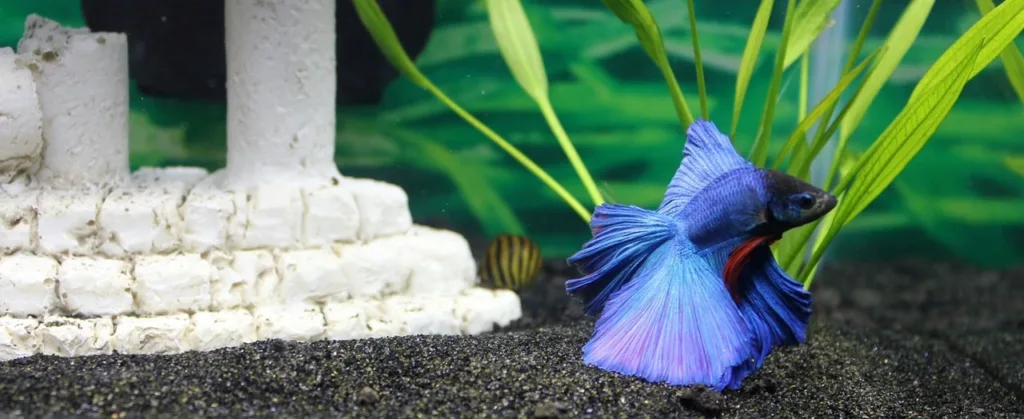
Friends, if your Betta’s health and happiness are your top priorities (as they should be!), then you’re probably on the lookout for the best diet options beyond the usual Goldfish fare. Well, you’re in luck because I’ve spent years fine-tuning the diets of my Betta fish and have some great suggestions to share. These alternatives not only cater to their nutritional needs but might also add a bit of excitement to their dining routine!
Commercial Betta Fish Pellets and Flakes
First off, commercial Betta fish pellets and flakes are a game-changer. These are formulated specifically for Bettas, considering their carnivorous diet needs. What I’ve noticed is that high-quality brands often include a mix of proteins, vitamins, and minerals designed to enhance coloration and ensure overall health. I always make sure to pick pellets that are the right size for Betta’s small mouths — this makes feeding time not just nutritious but also hassle-free.
Live and Frozen Foods: Bloodworms, Brine Shrimp, and Daphnia
Now, for a real treat, I turn to live and frozen foods such as bloodworms, brine shrimp, and daphnia. Not only are these a rich source of protein, but they also provide the added excitement of hunting, keeping my Bettas active and engaged. From personal experience, I’ve observed an undeniable boost in energy and vibrancy when these are added to the diet, even if just a couple of times a week. It’s like watching natural instincts come alive in the confines of their tank!
Homemade Betta Fish Diets: Recipes and Formulations
Going the extra mile, I’ve dabbled in preparing homemade Betta fish diets. Crafting recipes and formulations tailored specifically to my Bettas’ preferences and needs has been a rewarding experiment. Ingredients like cooked and peeled peas (sparingly, as they’re carnivores but this helps with digestion), tiny shrimp pieces, or finely chopped earthworms can create a culinary delight that’s both nutritious and palatable to them. Always ensure the pieces are small enough for easy consumption to prevent choking hazards.
Vegetable Supplements for Balanced Nutrition
Though it may seem counterintuitive, given their carnivorous nature, occasionally incorporating a tiny amount of vegetable matter can provide additional nutrients not typically found in meat. I’ve experimented with adding a minuscule bit of steamed, unsalted zucchini or cucumber to their diet. It’s not a daily thing, but every now and then, it seems to assist in their overall digestive health. Just remember, moderation is key since too much can upset their carnivorous stomachs.
The Role of Dietary Variety in Betta Fish Health
Mixing up your Betta’s diet is not just about keeping mealtime exciting; it also plays a critical role in their health. Dietary variety helps mimic the range of nutrients they’d naturally encounter in the wild and can prevent nutritional deficiencies. From my years of keeping Bettas, I’ve learned that when their dietary needs are fully met, they’re more resilient, more active, and their colors… oh, their colors shine brilliantly!
Best Practices for Feeding Betta Fish
Ah, fellow Betta enthusiasts, buckle up because we’re about to dive into one of the most pivotal aspects of Betta care – feeding practices! Cultivating a vibrant, healthy Betta starts with what, how, and when they eat. I’ve gathered pearls of wisdom over my fishkeeping years, and I’m thrilled to share them with you. Get ready to turn feeding time into a highlight of your day, every day!
Establishing a Feeding Schedule
Consistency, dear friends, is the golden key. Establishing a regular feeding schedule helps regulate your Betta’s metabolism and keeps their little aquatic world predictable and stress-free. In my routine, mornings and evenings have become sacred feeding times. It’s not just about dispensing food; it’s a moment of connection, a ritual that strengthens the bond between us. Keeping to a schedule also means you can monitor their health and happiness daily.
Portion Control and Avoiding Overfeeding
Now, it’s tempting to shower our finned friends with love in the form of food, but restraint is the name of the game. Overfeeding leads to water pollution and can cause health issues like bloating. The golden rule I follow? Offer only as much as they can consume in two minutes. Start small. It’s always better to err on the side of caution and give a little more if they still seem hungry, than to overdo it from the get-go.
Observing Betta Fish Behavior and Adjusting Feeding Regimen Accordingly
Observation is your best friend. Each Betta has its unique personality and appetite, which can change due to various factors, including water conditions and health. If I notice my Betta darting eagerly to their food, I take it as a sign of a healthy appetite. Conversely, if they’re indifferent or sluggish, it might signal that something’s amiss. This keen observation allows me to adjust their diet – maybe it’s time to spice things up with a different type of food or cut back if I’ve been overindulgent.
Introducing Variety While Keeping Diet Balanced
Don’t shy away from mixing things up. A diverse diet not only keeps your Betta keen but also ensures they’re getting a broad spectrum of nutrients. From high-quality pellets as the staple to live or frozen treats that initiate a little hunt in the tank, variety is crucial. I revel in watching my Betta’s excitement when it’s time for those special treats. Remember, diversity is the spice of life, even underwater!
Water Quality and Its Impact on Feeding
One aspect often overlooked is how water quality affects Betta appetite and digestion. A pristine environment means your Betta can focus on enjoying their meals rather than fighting off stress. Regular water changes and monitoring for the right pH and temperature ensure that their little aqua haven is as inviting and comfortable as possible, encouraging hearty eating habits.
Addressing Common Feeding Issues and Concerns
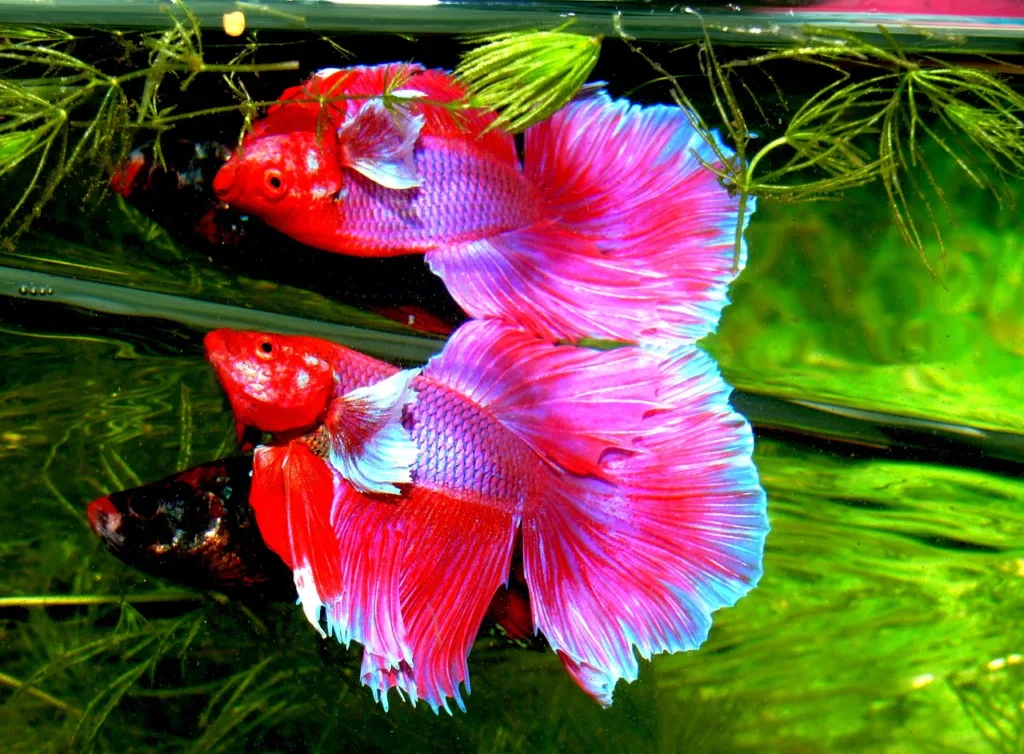
Hello fellow Betta lovers! It’s time to tackle some of the more finicky aspects of Betta care—feeding issues and concerns. Throughout my years of Betta keeping, I’ve navigated through quite a few dietary puzzles, and I’m here to share what’s worked for me. From preventing constipation and bloat to encouraging a picky eater, there’s a lot we can do to ensure our Bettas lead happy, healthy lives.
Constipation and Bloat Prevention
Nobody wants to see their Betta suffer from discomfort, and constipation is a common culprit. One trick I’ve learned is to include fasting days into their diet. Giving your Betta a break from feeding once a week helps clear their digestive track. Also, incorporating daphnia into their diet acts like a little fiber boost, aiding in digestion. Remember, moderation is key; even with beneficial foods, too much of a good thing can lead to issues.
Stimulating Betta Fish Appetite
There are times when your Betta might not seem as interested in food as usual. Before panicking, check your water quality—poor conditions can affect their appetite. If the water checks out, try shaking things up with a variety of foods. Sometimes, all it takes is a little change to get their taste buds excited again. And if you’re using pellets, soaking them in garlic juice not only makes them more appealing but can also boost your Betta’s immune system.
Dealing with Picky Eaters and Dietary Preferences
Just like us, Bettas have their preferences. If you find your Betta turning its nose up at what you offer, don’t lose heart. Trial and error with different foods helped me identify what tickles my Bettas’ fancy. Sometimes, switching from pellets to frozen or live foods can make a world of difference. Understand your Betta’s dietary needs and preferences, and you’ll find the right balance.
Ensuring Adequate Nutrition Amid Challenges
Ensuring your Betta gets all the nutrition they need, especially when facing feeding challenges, calls for creativity. I mix nutritional supplements into their food to bolster their intake. Vitamin-enriched foods can be particularly helpful for picky eaters or during recovery from illness. Always aim for a diet that mirrors the nutritional diversity they would experience in the wild.
Managing Overzealous Eaters
Curiously, some Bettas are too eager when it comes to feeding time, gobbling up more than their fair share if you’re keeping more than one in a properly divided and sized tank. To manage this, I use feeding rings to allocate portions and ensure slower eaters get their chance. This not only prevents overeating but also keeps the tank cleaner by reducing leftover food.
Consulting with Experts and Experienced Aquarists
Hello, wonderful community of Betta lovers! I cannot stress enough how vital it is to lean on the wisdom of experts and seasoned aquarists when navigating the waters of Betta care, especially when it comes to their diet and health. My journey has been marked by invaluable advice that I’ve gathered from various specialists, and I’m excited to share these pearls of wisdom with you.
Seeking Advice from Veterinarians Specializing in Fish Health
One of the first steps I took when I started getting serious about Betta care was consulting veterinarians who specialize in fish health. Their insights into the nutritional needs and common health concerns of Bettas have been a backbone of my feeding strategy. It’s reassuring to have a professional’s perspective on how to maintain the well-being of my little aquatic buddies.
Joining Online Forums and Communities for Betta Fish Enthusiasts
The camaraderie and collective knowledge found in online forums and communities for Betta enthusiasts are truly unparalleled. It’s here that I’ve learned tricks of the trade, from the best types of food to strategies in dealing with common feeding issues. Engaging with fellow Betta lovers has not only broadened my knowledge base but also cemented my love for these vibrant creatures.
Consulting with Professional Aquarists and Hobbyists for Personalized Recommendations
There’s something incredibly valuable about getting one-on-one advice from professional aquarists and experienced hobbyists. Their personalized recommendations have helped me fine-tune my feeding techniques and choose the best products for my Bettas. It’s like having a mentor who guides you through the intricacies of Betta care.
Exploring Betta Care Literature for Comprehensive Insights
I’ve also made it a point to immerse myself in a variety of Betta care books and articles written by experts. This literature has been crucial in deepening my understanding of Betta nutrition and health. It’s amazing how much you can learn from the experiences and research of others dedicated to the care of these beautiful fish.
Attending Workshops and Seminars on Aquatic Pet Care
Lastly, attending workshops and seminars has opened up a whole new world of learning for me. These events provide live demonstrations and lectures from leading experts in the field, offering fresh perspectives and innovative techniques in Betta care. The interactive nature of these gatherings also allows for engaging discussions and the exchange of ideas with fellow enthusiasts.
My Opinion on Whether Betta Fish Can Eat Goldfish Food
In my personal experience, while Betta fish can technically eat goldfish food in a pinch, it’s not something I’d recommend for their long-term diet. Goldfish food is formulated with different nutritional values in mind, ones that cater more to the needs of goldfish, which differ significantly from those of Bettas. Bettas are carnivorous by nature, requiring a higher protein content and specific nutrients to thrive and maintain their vibrant colors and energy. Feeding them goldfish food consistently could lead to nutritional deficiencies or health issues over time. I always advocate for providing Bettas with a diet designed specifically for them, incorporating variety and foods rich in the protein and nutrients they naturally need. Remember, just because they can eat it, doesn’t mean they should. Always aim for optimum health and happiness for our finned friends!
